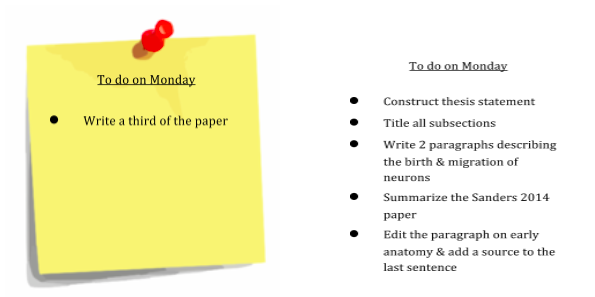The night before every exam or paper deadline is always the same for me:
Me: Why did I spend the last two weeks working on the opening sentence?!
Roommate: Didn’t you also watch the entire first season of Game of Thrones?
Me: For inspiration!
Roommate: [Raises eyebrows] On rodent neurogenesis?
Me: It’s ok—I have the rest of the night to work on this. I’m sure I can write seven pages by 9 am. If I spend one hour per page…plus time for minor edits…and I guess I should allot time to shower before class…
Me: [Spends the next ten minutes working on unnecessary calculations]
Roommate: Just start writing!
Me: Oh wait I got an email from the TA; I should probably check that first.
Me: The universe heard me—we get an extension of two whole days!
Roommate: Great—the paper might actually be decent if you start working on it now.
Me: I should probably update social media first, in case the rest of the class didn’t see the email. Plus, I’ll be way more productive in the morning…
This problem is not mine alone: one meta-analysis found that between 80 and 95 percent of college students procrastinate. (The same researchers found that the other 5-20% of them might be robots.)
Procrastinating is habitual, it’s stressful, and it results in suboptimal work—but is it preventable? Here are five verified ways to reduce procrastination while studying or paper writing.
1) Make a public deadline
If your exam is on Friday, agree to send a classmate your study notes by Monday or schedule a group study session on Tuesday. If a paper is due on the 30th of the month, tell your TA you’ll send him a draft by the 14th. Social expectation is a great motivator, so you’ll feel pressured to not miss these deadlines. This isn’t the case for personal deadlines written in our private calendars, because we have no problem breaking promises to ourselves.
Even if you do end up delaying the draft or study session by a day or two, these public deadlines will guarantee that you’ve at least started writing or studying before the official deadline’s eve.
2) Log the number of hours it actually takes to complete an assignment
Humans consistently underestimate the time it will take to complete a lengthy task. This tendency is called the planning fallacy and results because we are overly optimistic about our own future actions and abilities. When students were asked how long it would take to finish their senior theses, the average estimate was over three weeks shorter than the average actual completion time!
The next time you sit down to write a paper or study for an exam, use your smart phone to record start and stop times for every session—even if some of those sessions consist entirely of staring at a blank computer screen. This exercise will help you prepare more realistic schedules in the future because you’ll have written evidence that a weekend really isn’t enough time to finish that ten-page paper.
3) Set many small goals
Divide a large task into multiple smaller tasks, and make them as specific as possible. Let’s compare the following lists:

The first attempted to break down the task of writing a complete paper, but the “sub-goal” is still too large, too vague, and ultimately overwhelming. The second list, on the other hand, lays out exactly what to do in succinct steps. These sub-goals are smaller, more specific, and therefore more manageable.
4) Reward yourself for accomplishing sub goals
After every bout of procrastination, I promised to never procrastinate again. But this declaration never worked, because I was repeatedly rewarded for procrastinating: Every time I stayed up all night putting together a sub-optimal assignment and submitting it in the brink of time, the lesson “procrastinating works” was reinforced, since I always technically got it done.
Rewarding yourself for completing sub-goals in a timely fashion attempts to reverse that lesson. After titling all sections, check social media for five minutes (don’t forget to set a timer!). After finishing the introduction, go get coffee. In addition to being rewarded for productivity, you’re also incentivized to be efficient because you have something to look forward to. There are many smart phone apps that can help you conquer small goals in service of one larger one. Procraster was built with this in mind – it allows users to divide a task into short time segments and provides a reward at the end of each interval.
5) Work in a distraction-free space
Working in my dorm room was procrastinator heaven – it allowed me to take naps and meander through the Internet without fear of judgment by my peers. For others, working in a crowded coffee shop was procrastinator heaven because it allowed them to be distracted by any and everyone who passed through. Most campuses have designated “quiet study spaces,” which I highly recommend. External distractions will be minimized because it’s quiet, and internal distractions will be minimized because other students are present (and can see what you are up to).
There is no magic formula to reduce procrastination. As with most things, you’ll get better as you continue to make a conscious effort to improve. Good luck fighting the battle of procrastination—now get to work!

Comments